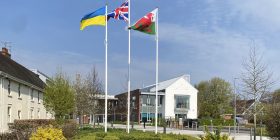Welsh Food Banks On The Increase
Wales now has 157 foodbanks which support people at risk of not being able to feed themselves and their families (data collected July 2015) compared to 16 in 1998.
These new statistics come from a research project by Bangor University Social Sciences PhD student David Beck.
The rise in number of food banks in Wales closely matches the situation in England.
Bangor Social Policy lecturer Dr. Hefin Gwilym says:
“The rise in foodbanks has been greatly hastened by welfare reform measures and austerity policies, particularly since the introduction of the Welfare Reform Act 2012.”
The largest ‘provider’ of food banks is the Trussell Trust- but these Food Banks are augmented by an unofficial network of small local independently run food banks- often the work of volunteers organising themselves or working through small charities, organisations or chapels, churches or other religious organisations.
Until now, no research has been done into how many food banks there are in Wales and exactly when they increased in number.
David Beck has been collecting information about food banks in Wales, where they are and when they came into existence and has some surprising results:
Wales had six independent food banks between 1998-2010- but this grew by 616% in the next five years to July 2015, when 43 independent food banks were traced.
The Trussell Trust’s seven food banks grew to 36 during the same period. The Trust had three satellite foodbanks through till 2010, and now has 78: a 2,500% increase.
What David’s research confirms is that benefit sanctions are having an adverse effect and driving people to resort to food banks to feed the family. The rise in food banks tracks austerity measures since last budget. These have seen more families forced to resort to food banks, with peaks around Christmas and September, when the need for new school uniforms stretched the budget capabilities of some families.
The new database has also uncovered that Food Banks are not just an urban phenomena: Rural Wales is (perhaps surprisingly) equally well-served. The scattered population in Anglesey are served by a mobile food bank, for example, able to deliver food to families who may also be challenged by high transportation costs and infrequent public transport.
“Whatever your view of food banks, either that they are a welcome safety net beyond the reduced welfare state- the Big Society writ large, or an unfortunate necessity- it’s good that they are providing a safety net- but better of there were no need for them at all,” says David Beck.
According to Dr Hefin Gwilym:
“Food banks are becoming institutionalised and an alternative to our familiar concept of the welfare state as more welfare provision is privatised or left to families and communities on a voluntary basis.”
Dr Hefin Gwilym also says that the rise in food banks in Wales is not surprising since the levels of poverty in Wales have remained disappointingly high at around 23%. Wales seems to be doing worse than comparable regions of England such as the NE England in tackling poverty.
In his research David Beck found that users of food banks did not necessarily identify themselves as poor despite living below the poverty line. When asking people about Food Bank use, respondents often identify people poorer or worse off than themselves. This is especially the case when whole communities are affected- this could be interpreted as ‘resilience’, or as a ‘normalisation’ of the state of poverty.
One interesting question that emerges from David Beck’s findings is whether things would be different if welfare and social security were devolved to Wales. Currently social security is managed in Whitehall.
Catherine Williams CARDIFF FOODBANK Operational Manager said:
“Cardiff Foodbank has continued to see a rise in people struggling to make ends meet. Foodbank demand has continued to be high with over 4500 food parcels given out since April 2015, providing food to 4,400 children. We have increased our distribution centres from 5 to 6 in the city and aim to add another one per year for the next three years. We are only able to cope with this level of demand due to the generosity of our partner churches, volunteers and donors, with their help we hope to be able to continue to provide a vital safety net to people in times of need.”
Carl Owen, Financial Inclusion Officer at Môn Communities First said:
“What we’re finding as whole communities are facing economic hardship is that our donations are declining. With this in mind, we’ve established a network and partnership working among the food banks on Anglesey so that we can share resources and best practice. We need to raise our profile and create new donation streams in order that we can continue to provide the support needed in our communities.”
Spotted something? Got a story? Email News@News.Wales










